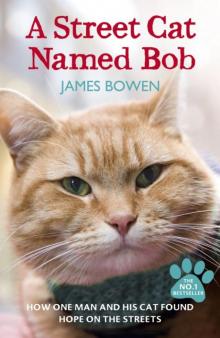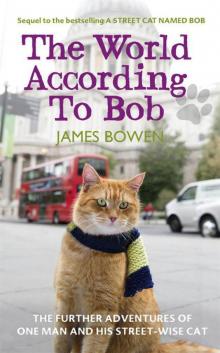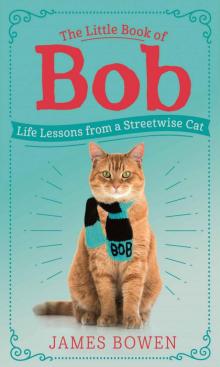- Home
- James Bowen
A Street Cat Named Bob Page 15
A Street Cat Named Bob Read online
Page 15
As I’d discovered at Covent Garden, however, Bob had the magical ability to slow them down. People would see him and suddenly they weren’t in quite such a rush. It was as if he was providing them with a little bit of light relief, a little bit of warmth and friendliness in their otherwise frantic, impersonal lives. I’m sure a lot of people bought a Big Issue as a thank you for me giving them that little moment. So I was more than happy to take what was supposed to be a ‘difficult’ pitch right outside Angel tube.
We started that same week. I left the Covent Garden vendors to it.
Almost immediately we began to get people slowing down to say hello to Bob. We had soon picked up where we had left off in Covent Garden.
One or two people recognised us.
One evening, a well-dressed lady in a business suit stopped and did a sort of double take.
‘Don’t you two work in Covent Garden?’ she said.
‘Not any more, madam,’ I said with a smile, ‘not any more.’
Chapter 16
Angel Hearts
The move to Angel had definitely met with Bob’s seal of approval; I only had to look at his body language each day as we headed to work.
When we got off the bus at Islington Green, he wouldn’t ask to climb on my shoulders in the way he tended to do when we’d been in central London. Instead, most mornings he would take the lead and march purposefully ahead of me, down Camden Passage, past all the antique stores, cafés, pubs and restaurants, and along towards the end of Islington High Street and the large paved area around the tube station entrance.
Sometimes we’d need to head to the Big Issue coordinator on the north side of the Green, so we’d take a different route. If that was the case, he’d always make a beeline for the enclosed garden area at the heart of the Green. I’d wait and watch while he rummaged around in the overgrowth, sniffing for rodents, birds or any other poor unsuspecting creature upon which he could test his scavenging skills. So far, he’d drawn a blank, but it didn’t seem to dampen his enthusiasm for sticking his head into every nook and cranny in the area.
When we eventually arrived at his favourite spot, facing the flower stall and the newspaper stand near one of the benches by the entrance to the Angel tube station, he would stand there and watch me go through the arrival ritual, placing my bag down on the pavement and putting a copy of the Big Issue in front of it. Once all this was done, he would sit himself down, lick himself clean from the journey and get ready for the day.
I felt the same way about our new stamping ground. After all the trouble I’d had at Covent Garden over the years, Islington seemed like another fresh start for us both. I felt like we were starting a new era, and that this time it was going to last.
The Angel was different from Covent Garden and the streets around the West End in lots of subtle ways. In central London, the streets were mostly crammed with tourists and, in the evenings, West End revellers and theatregoers. The Angel wasn’t quite as busy, but the tube station still saw a mass of humanity pouring in and out each day.
It was a distinctively different type of person, though. There were still a lot of tourists, of course, many of them drawn to the restaurants and arty venues like Sadler’s Wells and the Islington Business Design Centre.
But it was also a more professional and, for want of a better word, more ‘upmarket’ place. Each evening I’d notice hordes of people in business suits heading in and out of the tube station. The bad news was that most of them barely even registered the fact that there was a ginger cat sitting outside the station. The good news was that a large proportion of those who did slow down and spot him took an instant shine to Bob. They were also really generous. I noticed immediately that the average purchase and tip at Islington was just that little bit bigger than in Covent Garden.
The Angel locals were also generous in a different kind of way to those in Covent Garden. Almost as soon as we began selling the Big Issue there, people began giving Bob bits of food.
The first time it happened was on our second or third day. A very smartly dressed lady stopped for a chat. She asked me whether we were going to be there every day from now on, which struck me as a bit suspicious. Was she going to make some sort of complaint? I was completely off the mark, however. The following day she appeared with a small Sainsbury’s bag containing some cat milk and a pouch of Sheba.
‘There you go, Bob,’ she said happily, placing them on the pavement in front of Bob.
‘He’ll probably have that at home tonight if that’s OK,’ I said, thanking her.
‘Of course,’ she said. ‘As long as he enjoys it that’s the main thing.’
After that, more and more locals started donating titbits for him.
Our pitch was down the road from a large Sainsbury’s supermarket. It soon became obvious that people were going in there to do their normal shopping and were picking up a little treat for Bob on their way round. They would then drop their presents off on their way back home.
One day, just a few weeks after we began at Angel, about half a dozen different people did this. By the end of the day, I couldn’t fit all the tins of cat milk, pouches of food and tins of tuna and other fish that had been piling up all day into my rucksack. I had to keep it all in a large Sainsbury’s bag. When I got back to the flat, it filled up an entire shelf in one of the kitchen cupboards. It kept us going for almost a week.
The other thing that was a world apart from Covent Garden was the attitude of the staff at the tube station. At Covent Garden I was the Antichrist, a hate figure almost. I could count the number of people with whom I’d forged a good friendship in the years I’d been busking or selling the Big Issue there on the fingers of one hand. In fact I didn’t even need that. I could think of two at most.
By contrast, the staff at Angel were really warm and generous towards Bob from the very beginning. One day, for instance, the sun had been blazingly hot. The mercury must have been up in the 90s at one point. Everyone was walking around in shirt sleeves even though, technically, it was autumn. I was sweating like crazy in my black jeans and black T-shirt.
I deliberately placed Bob in the shade of the building behind us so that he didn’t get too hot. I knew that heat was bad for cats. An hour or so after we’d set up our pitch, it became clear to me that I’d soon need to get some water for Bob. But before I was able to do something, a figure appeared from inside the tube station with a nice clean, steel bowl brimming with clear water. I recognised the lady immediately. Her name was Davika, one of the ticket attendants, she’d stopped to talk to Bob on numerous occasions already.
‘Here you go, Bob,’ she said, stroking him on the back of the neck as she placed the bowl in front of him. ‘Don’t want you getting dehydrated now, do we?’ she said.
He wasted no time in diving in and lapped it up in no time whatsoever.
Bob had always had this ability to endear himself to people, but it never ceased to amaze me just how many seemed to become devoted to him. He had won the Islington crowd over in a matter of weeks. It was amazing really.
Of course, it wasn’t perfect at the Angel. This was London after all. It could never have been all sweetness and light. The biggest problem was the concentration of people working the area around the tube station.
Unlike Covent Garden where all the surrounding streets were alive with activity, at the Angel things tended to be concentrated around the tube. So as a result there were a lot of other people operating on the streets, from people dishing out free magazines to charity workers - or ‘chuggers’, as they were known.
This was one of the biggest changes that I’d noticed since I’d started working on the streets a decade earlier. The streets were very much more competitive than they used to be. The ‘chuggers’ were mostly hyper-enthusiastic young people working for charities. Their job was to collar well-heeled commuters and tourists and get them to listen to a spiel about their charity. They would then try to persuade them to sign up for direct debits to be taken from thei
r bank accounts. It was like being mugged by a charity - hence their nickname: chuggers.
Some were third world charities others were health related, to do with cancer or other illnesses like cystic fibrosis and Alzheimer’s. I didn’t have a problem with them being there but it was the way they hassled people that annoyed me. I had my own sales spiel for the Big Issue, of course. But I wasn’t as intrusive or as nagging as some of these. They would follow people down the road engaging them in conversations they didn’t want to have.
As a result of this, I would see people emerge from the tube station, see a wall of these enthusiastic canvassers, usually in their loud coloured T-shirts, and make a run for it. A lot of them were potential Big Issue buyers so it was very annoying.
If someone was really driving people away I would have a word. Some of the canvassers were fine about it. They respected me and gave me my space. But others didn’t.
One day I got into a heated argument with a young student with a mop of Marc Bolan-like curls. He’d been really irritating people by bouncing around and walking alongside them as they tried to get away. I decided to have a word.
‘Hey, mate, you’re making life difficult for the rest of us who are working here,’ I said, trying to be civil about it. ‘Can you just move along the road a few yards and give us some space?’
He’d got really antsy about it. ‘I’ve got every right to be here,’ he said. ‘You can’t tell me what to do and I will do what I want.’
If you want to get someone’s back up, you just need to say something like that. So I put him straight on the fact that while he was trying to make pocket money to fund his ‘gap year’, I was trying to make money to pay for my electricity and gas and to keep a roof over my and Bob’s head.
His face kind of sank when I put it in those terms.
The other people who were a real irritant for me were the people who sold the assorted free magazines that were being published now. Some of them - like StyleList and ShortList– were actually good-quality magazines, so they caused me no end of problems, the simplest of which boiled down to a question: why were people going to pay for my magazine when they could get a free one from these people?
So whenever one strayed into my area I’d try to explain it to them. I’d say to them straight up: ‘We all need to work, so you need to give me some space to do my job, you need to be at least twenty feet away.’ It didn’t always work, however, often because a lot of the vendors who sold these magazines didn’t speak English. I would try to explain the situation to them but they didn’t understand what I was trying to say to them. Others simply didn’t want to listen to my complaints.
By far the most annoying people to work the streets around me, however, were the bucket rattlers: the charity workers who would turn up with large plastic buckets collecting for the latest cause.
Again, I sympathised with a lot of the things for which they were trying to raise money: Africa, environmental issues, animal rights. They were all great, worthwhile charities. But if the stories I had heard about how much of the money disappeared into the pockets of some of these bucket shakers were true, I didn’t have much sympathy. A lot of them didn’t have licences or any kind of meaningful accreditation. If you looked at the laminated badges around their necks, they could have been something from a kid’s birthday party. They looked amateurish.
Yet, despite this, they were allowed inside the tube stations, a place that was an absolute no-go zone for a Big Issue seller. It would really nark me when I saw a bucket rattler inside the concourse hassling people. Sometimes they would be standing right up against the turnstiles. By the time they emerged out of the station the commuters and visitors were usually in no mood to be persuaded to buy the Big Issue.
It was, I suppose, a bit of a reversal of roles. In Covent Garden I had been the maverick who hadn’t stuck to the designated areas and bent the laws a bit. Now I was on the receiving end of that.
I was the only licensed vendor in the area outside the tube station. And I’d worked out the areas that I could and couldn’t stray into with the other main sellers there - the newspaper vendor and the florist in particular. The chuggers, hawkers and bucket rattlers ran roughshod over those rules. I guess some people would have thought it was ironic, but there were times when I failed to see the funny side of it, I have to admit.
Chapter 17
Forty-eight Hours
The young doctor at the DDU – the drug dependency unit – scribbled his signature at the bottom of the prescription and handed it over to me with a stern expression on his face.
‘Remember, take this, then come back to me at least forty-eight hours later when you can feel the withdrawal symptoms have really kicked in,’ he said, holding my gaze. ‘It’s going to be tough, but it will be a lot tougher if you don’t stick to what I’ve said. OK?’
‘OK, I understand,’ I nodded, picking myself up and heading out of his treatment room. ‘Just hope I can do it. See you in a couple of days.’
I’d been turning up at my fortnightly consultations for a couple of months since we’d first talked about coming off methadone. I thought I was ready for it, but my counsellors and doctors obviously didn’t share that opinion. Each time I’d come in they had kept postponing it. I’d not got any kind of explanation as to why this was. Now, at last, they had decided it was time: I was going to make the final step towards being clean.
The prescription the counsellor had just given me was for my last dose of methadone. Methadone had helped me kick my dependence on heroin. But I’d now tapered down my usage to such an extent that it was time to stop taking it for good.
When I next came to the DDU in a couple of days’ time I would be given my first dose of a much milder medication, Subutex, which would ease me out of drug dependency completely. The counsellor described the process as like landing an aeroplane, which I thought was a good analogy. In the following months he would slowly cut back my dosage until it was almost non-existent. As he did so, he said I would slowly drop back down to earth, landing - hopefully - with a very gentle bump.
As I waited for the prescription to be made up today, I didn’t really dwell on the significance of it. My head was too busy with thoughts about what lay ahead during the next forty-eight hours.
The counsellor had explained the risk to me in graphic detail. Coming off methadone wasn’t easy. In fact, it was really hard. I’d experience ‘clucking’ or ‘cold turkey’, a series of unpleasant physical and mental withdrawal symptoms. I had to wait for those symptoms to become quite severe before I could go back to the clinic to get my first dose of Subutex. If I didn’t I risked having what’s known as a precipitated withdrawal. This was basically a much worse withdrawal. It didn’t bear thinking about.
I was confident at this point that I could do it. But at the same time I had an awful niggling feeling that I could fail and find myself wanting to score something that would make me feel better. But I just kept telling myself that I had to do this, I had to get over this last hurdle. Otherwise it was going to be the same the next day and the next day and the day after that. Nothing was going to change.
This was the reality that had finally dawned on me. I’d been living this way for ten years. A lot of my life had just slipped away. I’d wasted so much time, sitting around watching the days vanish. When you are dependent on drugs, minutes become hours, hours become days. It all just slips by; time becomes inconsequential, you only start worrying about it when you need your next fix. You don’t even care until then.
But that’s when it becomes so awful. Then all you can think about is making money to get some more. I’d made huge progress since I’d been in the depths of my heroin addiction years earlier. The DDU had really put me back on track. But I was just sick of the whole thing now. Having to go to a chemist every day, having to visit the DDU every fortnight. Having to prove that I hadn’t been using. I had had enough. I now felt like I had something to do with my life.
In a way I’d made it hard
er on myself by insisting on doing it alone. I had been offered the chance several times to join Narcotics Anonymous but I just didn’t like the whole twelve-step programme. I couldn’t do that kind of quasi-religious thing. It’s almost like you have to give yourself up to a higher power. It just wasn’t me.
I realised that I was making life even more difficult for myself by taking that route. The difference was I didn’t think I was on my own now. I had Bob.
As usual, I didn’t take him with me to the DDU clinic. I didn’t like exposing him to the place. It was a part of my life I wasn’t proud about, even though I did feel I’d achieved a lot since I’d first visited.
When I got home he was pleased to see me, especially as I’d stopped off at the supermarket on the way home and had a bag full of goodies intended to get us through the next two days. Anyone who is trying to get rid of an addictive habit knows what it is like. Whether it’s trying to give up cigarettes or alcohol, the first forty-eight hours are the hardest. You are so used to getting your ‘fix’ that you can’t think of anything else. The trick is to think of something else, obviously. And that’s what I hoped to do. And I was just really grateful that I had Bob to help me achieve it.
That lunchtime we sat down in front of the television, had a snack together - and waited.
The methadone generally lasted for around twenty hours so the first part of the day passed easily enough. Bob and I played around a lot and went out for a short walk so that he could do his business. I played a really old version of the original Halo 2 game on my knackered old Xbox. At that point it all seemed to be plain sailing. I knew it couldn’t stay that way for much longer.

 A Gift From Bob
A Gift From Bob A Street Cat Named Bob
A Street Cat Named Bob The World According to Bob
The World According to Bob The Little Book of Bob
The Little Book of Bob